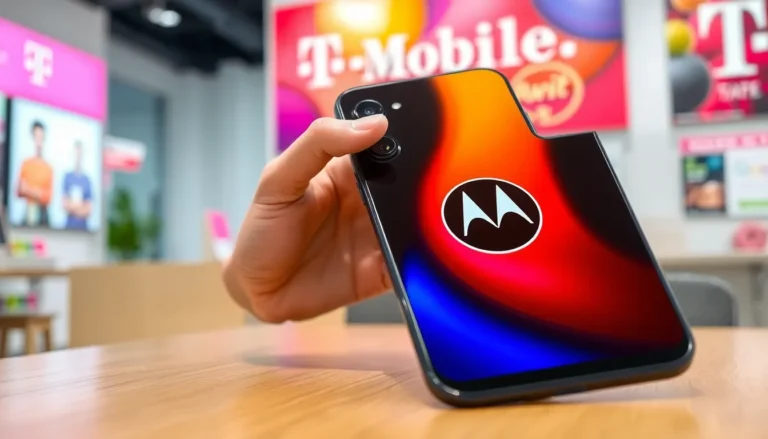In a world where smartphones are practically glued to our hands, mobile marketing has become the secret sauce for brands looking to connect with consumers. If you think about it, your phone is like a mini shopping mall that fits in your pocket. With just a few taps, you can order pizza, book a flight, or even find a date—talk about multitasking!
Table of Contents
ToggleOverview Of Mobile Marketing
Mobile marketing encompasses the strategies and techniques used to connect with consumers via their mobile devices. The rapid growth of smartphone usage transforms how brands engage with audiences, making mobile marketing essential. It enables companies to reach potential customers through channels like SMS, mobile apps, and social media platforms.
Smartphones allow consumers to interact with brands directly, making the purchasing process seamless. Mobile marketing strategies include location-based targeting, which delivers personalized messages to users based on their physical location. Furthermore, mobile-friendliness of websites and campaigns plays a crucial role in user experience.
Investing in mobile marketing increases brand visibility and customer loyalty. According to recent studies, over 60% of consumers utilize smartphones for online shopping, underscoring the need for effective mobile strategies. Brands leveraging mobile marketing effectively create tailored content and promotions that resonate with their audience.
Mobile apps offer unique opportunities for engagement and retention. Features like push notifications keep users informed about promotions or new products, fostering customer relationships. Businesses can analyze user behavior within apps, enabling them to optimize their offerings continuously.
Incorporating social media into mobile marketing enhances communication and outreach. Platforms like Instagram and Facebook provide targeted advertising options, ensuring brands reach the right audience. Advertisements tailored for mobile devices tend to achieve higher engagement rates compared to traditional formats.
Overall, mobile marketing stands as a critical component of modern marketing strategies, driving success by aligning with consumer behavior and preferences.
Importance Of Mobile Marketing
Mobile marketing plays a vital role in connecting brands with their audience in today’s ever-evolving digital landscape.
Reaching A Wider Audience
Mobile marketing allows businesses to tap into a vast audience by leveraging the high smartphone penetration. Statista reported that over 87% of the U.S. population owns a smartphone. Companies can utilize SMS marketing and mobile apps to distribute messages quickly and widely. With targeted advertising on platforms like Instagram and Facebook, brands can enhance reach based on user demographics and interests. Geolocation targeting enables brands to send promotions directly to potential customers in specific areas, ensuring communications are relevant and timely. This strategic approach empowers brands to connect effectively with varied audiences, promoting customer acquisition and retention.
Enhancing Customer Engagement
Mobile marketing enhances customer engagement through personalized experiences delivered directly to users’ devices. Push notifications keep users informed about new products, deals, or relevant content, creating real-time interaction. Mobile-friendly websites enable seamless browsing, leading to higher conversion rates. Engaging content, such as videos or interactive advertisements, ensures users remain interested in brand messaging. Furthermore, integrating social media with mobile marketing strategies facilitates quick sharing and interaction among users. Such engagement drives brand loyalty, encouraging repeat purchases and fostering long-term relationships. By leveraging these methods, brands can keep their audience actively engaged with their offerings.
Strategies For Effective Mobile Marketing
Mobile marketing strategies play a critical role in engaging consumers effectively. Prioritizing mobile-friendly approaches ensures brands meet user expectations.
Mobile-Friendly Content
Creating mobile-friendly content remains essential for effective communication. Visual elements such as images must be optimized for smaller screens. Short paragraphs enhance readability, allowing users to grasp key messages quickly. Calls to action should be prominent, guiding users toward desired actions without confusion. Research indicates that mobile-optimized pages see conversion rates increase by up to 160%. Brands that prioritize speed deliver a seamless experience, reducing bounce rates. Incorporating responsive design accommodates various screen sizes, ensuring accessibility across devices.
Location-Based Marketing
Location-based marketing leverages geolocation technology to create personalized experiences. This strategy targets consumers based on their physical location, increasing relevance and engagement. Brands using location data can send timely promotions to users in proximity. Studies show that 73% of consumers respond positively to location-based messages. Utilizing geofencing enables brands to trigger notifications when customers enter specified areas. Effective location-based marketing encourages foot traffic to retail locations while enhancing customer satisfaction through timely offers. Overall, this approach cultivates a more personal connection between brands and consumers by delivering contextual content.
Tools And Technologies In Mobile Marketing
Mobile marketing relies on several essential tools and technologies that enhance engagement and connectivity. These tools help businesses optimize their outreach to mobile users effectively.
Mobile Apps
Mobile apps serve as a direct line of communication between brands and consumers. They allow companies to deliver personalized content and promotions efficiently. Push notifications within these apps keep users informed of updates, enabling real-time interactions. A study shows that users spend an average of 30 hours per month on mobile apps, underscoring their importance in mobile marketing. Enhancing user experience through intuitive design can lead to increased customer retention. Brands that integrate features like in-app purchases simplify the buying process and improve conversion rates.
SMS Marketing
SMS marketing remains a powerful tool for immediate engagement. With 98% of text messages opened, it offers brands a high visibility rate. Companies can send timely promotions and alerts directly to consumers’ phones, resulting in quick interactions. Targeted SMS campaigns yield higher response rates, especially when personalized. Research indicates that 75% of consumers appreciate receiving texts from brands about special offers. Businesses can effectively drive traffic to websites, boost sales, and enhance customer relationships through strategic SMS marketing.
Challenges In Mobile Marketing
Mobile marketing faces several challenges that can impede its effectiveness. Users often encounter an overwhelming volume of advertisements on their devices, leading to ad fatigue. This saturation can diminish engagement rates as consumers become desensitized to promotional content.
Another critical challenge is maintaining privacy and data security. As mobile users grow more concerned about their personal information, brands must ensure compliance with regulations like GDPR and CCPA. These laws require transparency in data collection, which can limit certain targeting strategies that rely on user data.
Navigating device diversity presents additional hurdles. With countless smartphone models and operating systems, optimizing campaigns for various screen sizes and functionalities becomes essential. Brands aiming for mobile marketing success must test their content across multiple devices to ensure consistency.
Balancing personalization and privacy remains a tightrope walk. While personalized messaging can significantly elevate consumer engagement, too much personalization risks crossing privacy boundaries. Striking the right balance fosters trust without compromising user comfort.
Limited budgets can also restrict mobile marketing efforts. Smaller companies often struggle to allocate funds for comprehensive mobile campaigns, which can impact their ability to leverage complex technologies effectively. These constraints can hinder their capacity to compete with larger brands boasting bigger marketing budgets.
Lastly, the reliance on quick results can create pressure on marketers. Many organizations expect immediate returns on their mobile marketing investments. This impatience can lead to hasty decisions, undermining long-term strategies that prioritize sustained engagement and brand loyalty. Each of these challenges must be addressed for a comprehensive approach to succeed in mobile marketing.
Mobile marketing is no longer a luxury; it’s a necessity for brands looking to thrive in a smartphone-centric world. As consumers increasingly rely on their devices for shopping and engagement, businesses must adapt their strategies to meet these evolving needs. By leveraging mobile apps SMS marketing and location-based targeting, brands can create personalized experiences that resonate with their audience.
Navigating the challenges of mobile marketing is crucial for success. Brands that prioritize mobile-friendly content and maintain a balance between personalization and privacy will likely see enhanced engagement and loyalty. Staying ahead in this dynamic landscape requires continuous innovation and a commitment to understanding consumer behavior. Embracing mobile marketing is essential for any brand aiming to connect meaningfully with today’s mobile-savvy consumers.




